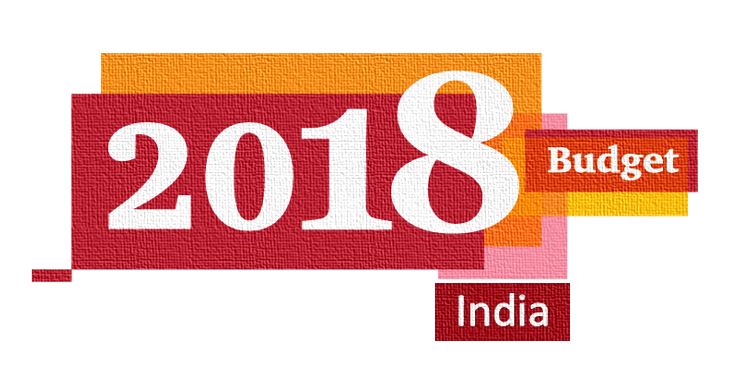The Union Budget 2018-19 is around the corner and we start getting different views and pre-budget expectations from different companies. So, here we are going to add all views those have been shared with us in this article. And also will update this list further with quotes and perspective as we get them from top company’s management.
On this Page show2018 Budget Expectations and Views

Pre-Budget Expectations
Mr. Avneet Singh Marwah, Director, and CEO of Super Plastronics Pvt. Ltd. (Kodak HD LED TV India)
 Last year the consumer electronics industry saw a decline by 10-15% due to 2 major reforms (GST & Demonetization). However, despite the initial decline, we welcome the reforms introduced by the government.
Last year the consumer electronics industry saw a decline by 10-15% due to 2 major reforms (GST & Demonetization). However, despite the initial decline, we welcome the reforms introduced by the government.
But televisions have been put under 28% GST, therefore we saw a larger decline in sales in Q3. As a result offline trade has taken the maximum hit and we expect GST on television should come down to 18%.
If the government does not consider a reduction, we may see jobs cut down by 35%.
Many companies have already started laying off their workforce. If India wishes to maintain its ‘fastest growing economy’ tag ,then we must increase consumerism, which can’t be achieved by placing a 28% tax bracket on a consumer electronics like smart televisions. In contrast, some of the biggest markets in the world have a tax structure below 12% on television and their market size is growing substantially. In India, the average screen size which was predicted to be at 38” in year 2017-18, still remains at 33”, in comparison.
The expectations from this budget for the consumer electronics industry is high and we hope that the Government is able to balance the reformed taxes with the income-expenditure of the layman.
Mr. Vivek Agarwal, Co-founder, M-tech Informatics Ltd

The upcoming Union Budget 2018 will be a significant one as it will be the first budget after a bold economic measure like GST has been implemented. We are likely to witness a whole lot of business and economy friendly measures being announced. Thanks to the government’s Make in India initiative which encouraged local manufacturing and augmented production, India has emerged as the second largest mobile phone market in 2018. As the country eyes the top position, the mobile phone industry expects the government to maintain and introduce more favorable policies for domestic manufacturers.
First, in order to prevent dumping of phones in the Indian market, the government should increase the duty on CBU’s to 20 % (recently govt. has increased duty on CBU’s from 10 % to 15%). This will provide domestic manufacturers a level playing field vis a vis importers and encourage them to expand capacity. Second, we expect the government to lower bank loan interest rate by 2%- 3 %.
Mobile phone manufacturing is a capital-intensive industry, with long credit cycles. Also, with the introduction of GST, a lot of working capital is tied up, making it tough for manufacturers. Furnishing a bank guarantee rather than blocking working capital would be a big relief. Therefore, to ease the pressure and make manufacturers more competitive, a lower interest rate coupled with bank guarantee would be crucial. Last but not the least; we hope the government extends the IGST benefits to manufacturers.
Mr. Srinivasan H.R., Managing Director, and Vice-chairman

Macroeconomics is at the desired level reigning in fiscal deficit and the trend of softening interest rates is here to stay. From a competitive landscape perspective, as an enterprise TAKE Solutions is very much aligned in the Life Sciences and Pharmaceuticals domain to industry requirements.
We need an increase in the core Research & Development investments in the current ‘Make in India’ initiative for more positive impact on organizations.
Nikhil Rungta, MD, Intuit India

In the upcoming budget, we expect increased incentives and budgetary allocation to encourage the flow of credit to SMEs. We are also hoping to have a business environment with minimum regulation and policies helping SMEs expand, grow, and go digital. For start-ups, we want the budget to foster an ecosystem to help them access capital easily and make investments in the segment lucrative. In the last year, while GST has been hailed as a much-needed overhaul of the indirect tax system, many small and medium-sized businesses (SMBs) across sectors – services and product alike – are still adapting to the new tax regime.
Of the 51 million SMBs present in the Indian market, around 20 percent are somewhat digital-savvy. Since the government is highly supportive of making India digitally tax-compliant, in the upcoming budget, we would like the Government to help small business by making it easier for them to adopt financial technology solutions that would help them make their tax filings faster and much more convenient.
Mr. Satya Prabhakar, Founder, and CEO, Sulekha

India has 10 to 15 million services MSME’s who run a wide variety of businesses. Across coaching & training services (school tuitions, computer training, job training, entrance exam coaching…) or home/business services (catering, pest control, security guards, interior decoration, architect…), our lives are impacted by tens of such small businesses who help consumers in most of the metro cities.
Most of these MSME’s have 1 to 5 employees and face 3 key challenges in growing their businesses – financial (funding, credit…), customer acquisition (acquiring new customers, retaining existing ones…) and regulatory compliance (forms, taxes…).
While large organizations can rely on multiple experts to solve all three aspects, MSME’s need a lot more support from the Government to help them scale-up. Budget 2018 can help MSME’s in these two aspects:
1) Help provide uncollateralized credit:
While lot of fintech organizations promise small-ticket personal loans, the ability to provide loans in the region of Rs. 2 to 10 lakhs using little collateral is beyond the ability of startups. The Govt. can aid in scaling up business loans for service MSME’s.
2) Reducing or removing GST on promotional spends:
Most MSME’s may come under the GST composition scheme that has a business turnover limit of Rs. 1.5 crores currently. Budget 2018 can look to see if marketing and promotional spends done by such entities are fully exempt from GST. This will help them to further invest and grow their business.
Once MSME’s cross this limit, they can easily start paying the additional 18% tax and grow their business further.
Sahil Chopra, CEO, and Founder, iCubesWire (pre-budget)

The announcement of Union budget is just around the corner with discussions & debates being conducted around it. There is hush-hush regarding the assumptions when everyone is expecting a positive release. As far as digital is concerned, besides the allocation of budgets on Digital Infra Development, there is a need to initiate a few reforms. Digital is the fastest growing sector of India & should be highly benefitted from the Union Budget.
As per my understanding, budgets should be allocated to PSUs for investing in digital marketing. This will lead to a win-win situation as for the organization the digital mediums will help gain recognition & support. While the digital agencies will spread awareness & educate the audience about the benefits of the organization. Even the digital organizations paying taxes dutifully should be recognized well & given the right opportunities to flourish.
Even on a personal level, the entrepreneurs who are platinum taxpayers should be given certain advantages as a reward for their contribution towards the nation. Any individual paying heavy taxes on time should be entitled to such benefits which could be in the form of a card similar to the other identity cards we have. This will not only be a welcomed move, but it will also ignite the zeal among the others to be a part of that category thereby benefitting the country.
However, what the budget is going to be will be interesting to witness & I hope for some reforms that help the digital sector in various ways.
Mr. Rajesh Rege, Managing Director, Red Hat, India on the Union Budget 2018-19
 Government-led programs like Digital India, Make in India, Smart Cities etc. are triggers for a boost in the country’s economy. These campaigns have opened a plethora of opportunities for IT industry as well. To truly realize the potential of these game-changing initiatives, it is important to harness the power of collaboration and by extension, Open Source.
Government-led programs like Digital India, Make in India, Smart Cities etc. are triggers for a boost in the country’s economy. These campaigns have opened a plethora of opportunities for IT industry as well. To truly realize the potential of these game-changing initiatives, it is important to harness the power of collaboration and by extension, Open Source.
In this budget, we look forward to continued focus on accelerating these initiatives using Open, Agile, Secure and Scalable solutions.
Mr. Rajeev Sharma, Head-Corporate Services & Strategic Planning, Mitsubishi Electric India Pvt. Ltd.
 This will be the Union budget after implementation of GST. We are hopeful that the government will roll-out many schemes and good-planning measures in this budget to achieve a GDP growth rate beyond 7% and increasing consumer confidence/spending.
This will be the Union budget after implementation of GST. We are hopeful that the government will roll-out many schemes and good-planning measures in this budget to achieve a GDP growth rate beyond 7% and increasing consumer confidence/spending.
Mitsubishi Electric India wants to be a contributor to this growth story and we expect that various reforms would be announced in this year’s budget which would be positive for our industry.
Amit Shukla, CEO, Pursuite.com

India’s hospitality industry is one of the key drivers of growth of its service sector. With a turnover of USD 71.53Bn in 2016, it accounted for 9.6% of GDP and was the third largest foreign exchange earner for the country. The sheer volume of business it is generating makes streamlining GST on hospitality imperative for Budget 2018.
The government has somewhat eased its taxation policy by a downward revision of rates or rationalization of tax slabs, however, a more detailed approach for resolving issues that still plague GST is required. For instance, IGST in not available to Hotels, the tax is calculated on declared rather than actual tariffs, luxury travel and stay are taxed at considerably higher rates, food and beverages sector suffers from the loss of input tax credit, all of which increase costs for end-users and subliminally disincentivizes consumption. With experts predicting overall industrial growth between 100%-200% in next couple of years, 2018 should see a significant expansion in HORECA industry; hence it would be highly beneficial if the government would fuel this growth with some planned tax benefits.
The hotel industry is highly capital intensive. Granting infrastructure status to this sector would enable hotels secure long-term loans at competitive rates which would help reduce room tariffs. Facilitating loan availability to small and medium enterprises under Mudra scheme with easier accessibility and larger outlays and granting tax benefits to remote businesses can further help the industry.
In addition, leading hospitality industries around the world revolve around a core group of highly skilled individuals – an area where India still lacks. Benefits of creating and maintaining a talent pool of skilled manpower would be significant. Were government to allocate some portion of the budget to this area, it would go a long way in making India the global leader in the hospitality sector.
Ishan Singh, CEO & MD RevStart, Active Angel Investor
The Indian government has done great work with the Atal Innovation Mission and Atal Tinkering labs which have focussed on grants to educational institutions, however, to accelerate commercialization, they need to partner with private for-profit incubators and accelerators.
For any budding entrepreneur, access to capital is the most critical factor to success. The government needs to establish a start up Bank like the SBA in the US and allow equity crowdfunding to ease the flow of equity capital and credit to entrepreneurs and start-ups.
Rohit Kulkarni, Country Manager, Payoneer, India
With the rollout of GST last year, many small-scale sellers and SMBs were involved in a lot of documentation process and had a lot of questions on the way GST works. The sellers had to classify their products categorically as the tax slab is different for different products. This year, I expect the government will simplify the process towards the online sellers and SMBs, who are expanding their businesses into the global marketplaces, with regards to GST, cross-border trading, conversion fees etc. India has shown a lot of potential in cross-border selling and there are millions of sellers from India, majorly from the tier 2 and tier 3 cities, who sell apparel, jewelry, handicrafts, etc. globally through various online selling platforms.
With cross-border payment providers, coming into the picture, there is now an easy and efficient medium to do the monetary transactions. This gives a better chance for Indian sellers to expand globally in the near future and the process can be eased up to a certain extent with proper support from the government. I hope that the government will take this into consideration while making the budget 2018 and come with reforms which will make cross-border transactions hassle-free and compliant.
Anil Valluri, President, NetApp India & SAARC
In the past few years, The Indian Government has initiated a series of initiatives, directed at driving overall change for the positive in the Economy, and results are sure to follow suit. One positive impact, for example, is the fact that The World Bank now ranks India as one of the top 100 nations in terms of business friendliness, a significant jump of 30 points from the preceding year. I believe more success and impact is yet to come. The upcoming budget will be an important one, as it will be expected to provide the ‘booster’ to this forward direction. This government has demonstrated that it values technology led governance for transparency & efficiency.
A stronger thrust on research and development that enables more indigenous innovation and increased investments in future technologies will be welcome. I do believe that we will see more of citizen-focused & friendly decisions, and initiatives to bolster investment into India.
Dr. Srikanth Sundararajan, Partner, Ventureast
The 2017 budget had quite a few positive implications for the start-up ecosystem – For starters, they allowed start-up companies to pay tax for 3 years out of 7 years only if they were making profits. This has provided start-ups with air cover to ensure growth. GST is a welcome move, because it simplified taxes for start-ups in several service-oriented areas, especially logistics, manufacturing, however, GST policies are not very clear, in addition, start-ups were expected to file GST returns on a monthly basis, which impacts cash flow and operations.
We believe what will really stand out for this budget is if there is a policy enabling start-ups to file for GST returns on an annual basis instead, which would lead to stabilization of operations. What would be good too if the service tax slabs could be made more uniform for start-ups in the services space giving them all an equal opportunity?
Related Posts
Top 10 Personal Financial Budgeting Software of 2021
Union Budget 2021: Know various executives’ opinion
Pre-Budget 2021 Expectations from Various Industry Veterans
7 Best and popular budget smartphone to buy this Diwali 2020
2020 Post-Budget Reactions from different Industries’ experts
2020 Union budget Expectations from different Tech Veterans (India)